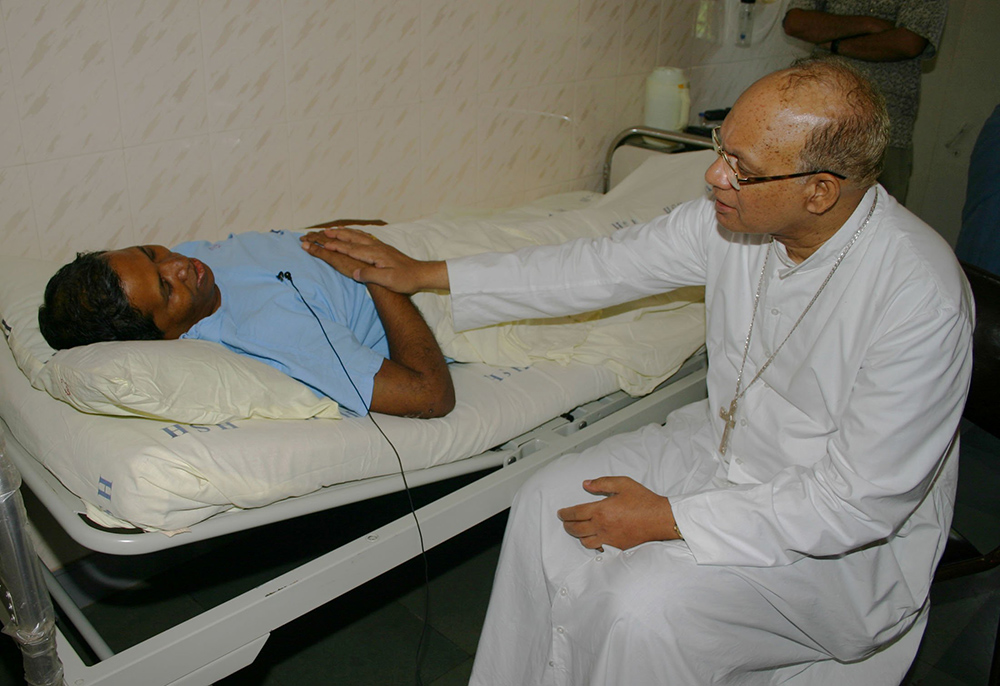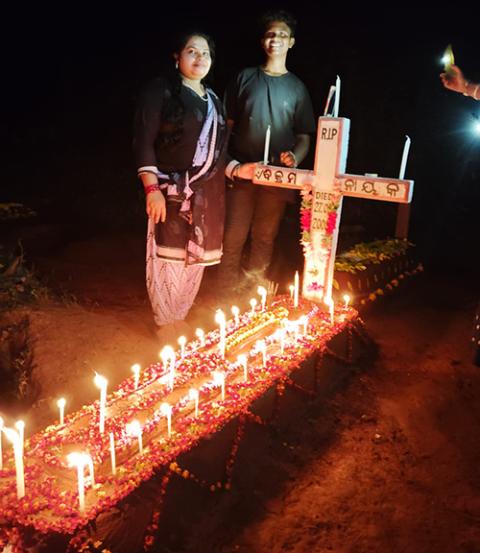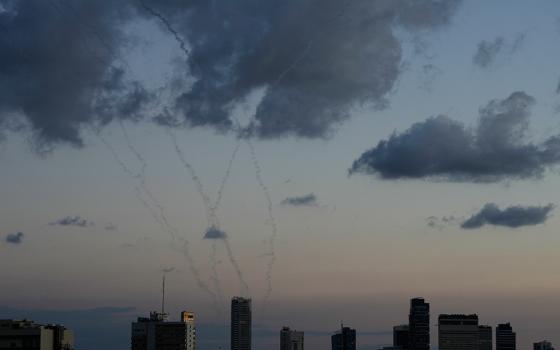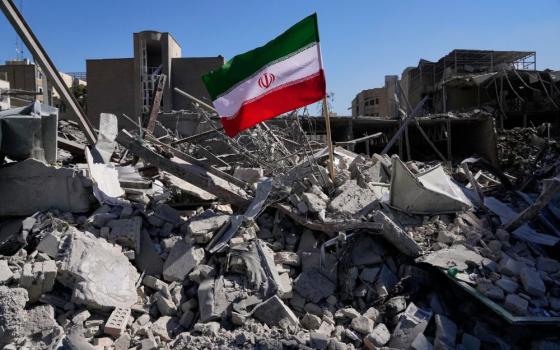
Cardinal Oswald Gracias of Mumbai, India, consoles Fr. Bernard Digal at Mumbai's Holy Family Hospital Sept. 6, 2008. Digal was severely beaten by Hindu extremists and left to die in the Kandhamal jungles Aug. 26, 2008, during anti-Christian violence. (CNS/Anto Akkara)
Archbishop John Barwa, of Cuttack-Bhubaneswar in the eastern Indian state of Odisha, announced on Oct. 25 in his official letter that "after careful consideration and prayerful discernment, the Congregation for the Cause of Saints has granted the Nihil Obstat, which signifies that there is no objection to commencing cause for the beautification of Kanteshwar Digal and Companions."
This marks a momentous occasion in the life of the Archdiocese of Cuttack-Bhubaneswar of the Odisha church and the church at large. The lives of Servant of God Kanteshwar Digal and companions has been a source of inspiration. Their unwavering faith during the 2008 Kandhamal anti-Christian persecution "has left an indelible mark on our spiritual journey," said the prelate.
The news was welcomed by all in Odisha and India. Certainly, it was a triumphant and prideful moment for the Christians of Odisha who had witnessed the violence and continue to bear the impact of it even today.
What resonates in everyone's heart is how ordinary people manifest unwavering religious convictions, standing by their faith, facing death, alienation from their family and village, and enduring the loss of land, property and comfort alike.
Advertisement
I had a chance to talk with some of the family members of these martyrs and their responses were awe-inspiring. One of them whom I met was Rajendra Digal, the son of martyr Kanteshwar Digal, whose name the Vatican has used for the title "Kanteshwar Digal and Companions, martyrs of Kandhamal," in the official letter of Nihil Obstat.
"My father was an ordinary man, a village catechist who stood by his faith and died for Christ. Today, the universal church recognizes him as a model of faith. Everyone will know him. Every year on his death anniversary (Sept. 24, 2008), I offer Mass for his soul. I felt miserable; we could not make a proper burial for my father as he was slaughtered and thrown in the river. Come what may, I will never betray Christ, the redeemer of the world," said Rajendra Digal.
When asked if he had any message for the perpetrators of violence, he said, "I wish the murderers had confessed their crime. Some of them are released on bail. May God forgive them. I hope they will never repeat it."
Kanteshwar Digal was from Sankarakhole village in Kandhamal district and was a staunch defender of his faith. A week after the anti-Christian violence broke out, the rioters summoned the Christians of Sankarakhole to a village field. All of them were forced to burn their Bibles and renounce their faith to join Hinduism.
When Kanteshwar refused to give up his faith, the rioters caught hold of him in a room, set fire to his home, feasted with his goat, cut off his throat, mutilated his genitals, and threw him in a river called Salungi. His family members recovered his decomposed body on the 11th day.
Another person, Lalita Digal of G. Udayagiri in Kandhamal district, was one of the women who refused to give up her faith in Christ and was killed by the Sangh Parivar (which refers to the collection of Hindutva organizations spawned by the Rashtriya Swayamsevak Sangh, which remain affiliated with it).

The grave of martyr Bikram Nayak. Standing by the gravesite are his wife Ashalota Nayak and their son. (Courtesy of Sujata Jena)
Prakash Digal, Lalita's son shared:
My mother was killed by my villagers who were Hindus. There were 45 Christian families in the Gudrikia village of Kandhamal district. The Hindus forced us to worship their gods. Forty families surrendered and joined the Hindus to save their lives. My family, along with four other families, refused to follow them and received death threats. We reported the concern at the police station and sought protection. We became refugees with a family near the police station. After several requests, the local police put us in a relief camp. More than three months later, my mother visited our village, thinking everything was okay. The villagers came in a group, took my mother to the forest, chopped her body, and buried her. A day later, one of the villagers who refused to give a witness to the fact told us the horrific story. We complained to the police station, but no one acted.
He added, "Till today, we do not dare to return to our village. We do not know if we will ever get our land and property back, but we are happy. We would rather die than convert to other religions."
Ashalota Nayak, the wife of martyr Bikram Nayak of Tiangia village, expressed her happiness at the news that her husband's cause for beatification was opened.
"I heard the news on Nov. 1 when I was going to prepare the graveyard of my husband to observe All Souls' Day. My husband became martyred for his faith in Christ. After some days, we will all venerate him," she said. "This is possible because he refused to give up his faith. If one day I had to face persecution for my faith in Christ, I would be ready to stand firm. My husband continues to inspire me."
She added:
On Aug. 24, 2008, a day after the violence broke out, the Bajarangi (a counterpart of Sangh Parivar) entered our house. They were dressed in orange-colored outfits and shouted Jai Shree Ram (Hail Lord Ram). They had axes, spears and swords. I was in the kitchen with my 5-month-old son. My husband was on another street. They took all our valuable items from our home. With my son, I ran away to the forest. Along with my husband, five others were killed.
The Vatican recognizes a total of 35 individuals, 24 men and 11 women, as martyrs in Kandhamal.
Kandhamal is a district in the eastern Indian state of Odisha. The 2008 Kandhamal communal violence stands out as an organized attack, representing the worst violence India's Christian community has faced in 300 years. The aftermath of the violence left thousands of youths, children, men and women, from Christian families, dead, wounded and perplexed. Hundreds of them became victims of human trafficking and child labor, and refugees in nearby forests and cities.
At that time, I was a newly professed religious of the Sacred Hearts community. Witnessing the faith of the people who gave themselves till the end struck me to the core. However, the consequences of this violence greatly disturbed me. I prayed and resolved to do something. With the support of my congregation, I ventured to visit people in the riot-affected areas scattered in many places. Over the years, we organized skill training for hundreds of youths, engaging them in gainful jobs in different parts of India. Women who were victims of rape and sexual assaults during the violence were also rehabilitated.
Remembering the Kandhamal incident is difficult and painful. Yet, it's not an isolated event. Today, as I write this, I know there are several pastors and believers, including Catholics, who are persecuted daily. Several of them are in jail for having faith in Christ. I remain dedicated to advocating for the rights of religious and social minorities in my country through networking and advocacy.






